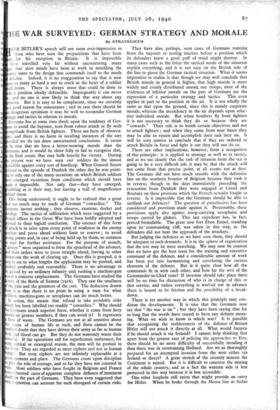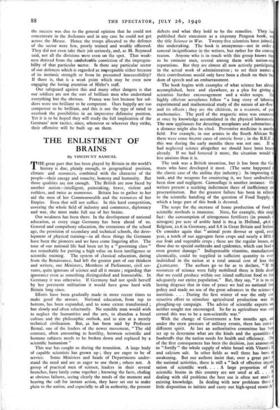HE WAR SURVEYED: GERMAN STRATEGY AND MORALE
By STRATEGICUS
ERR HITLER'S speech will not seem over-impressive to those who have seen the preparations that have been de for his reception in Britain. It is impossible hate travelled very far without encountering many ns that alert minds have been at work in moulding the untrv more to the design that commends itself to the needs defence. Indeed, it is no exaggeration to say_ that it now ms to many as hard a nut to crack as the heart of a soldier uld desire. There is always more that could be done to ke a position ideally defensible. Impregnable it can never ; and no one is now likely to think that way about any fensive. But it is easy to be complacent, since we certainly ve good reason for reassurance ; and in case there should be v dangerous optimism it may be well to reconsider German ategy and tactics in relation to morale.
Everyone has at some time dwelt upon the tendency of Ger- ns to avoid the bayonet, turn from robust attack or fly with omptitude from British fighters. These are facts of observa- ; and there is no harm in recalling instances of the sort ovided we do not draw unwarranted conclusions. It seems be true that we have a better-wearing morale than the ermans, and it could be sheer folly to fail to recognise that, the final count, that may bulk heavily for victory. During e present war we have seen our soldiers do the almost credible against every sort of handicap. When General Smuts ferred to the episode of Dunkirk the other day he was point- g to only one of the many occasions on which British soldiers ve emerged victorious from conditions which should have ade it impossible. Not only that—they have emerged, umbling as is their way, but leaving a trail of magnificence hind them.
'This being understood, it ought to be realised that a great eal too much may be made of German "cowardice." The rmans invent nothing ; they observe, examine, docket and evelop. The tactics of infiltration which were suggested by a rench officer in the Great War have been boldly adopted and ressed to their logical conclusion. The essence of this form attack is to seize upon every point of weakness in the enemy ition and press ahead without limit or reserve ; to avoid tug points and, in case of being held up by them, to summon r wait for further assistance. For the purpose of assault, groups" were organised to form the spearhead of the advance, d their orders were to press straight ahead, leaving to other rmations the work of clearing up. Once this is grasped, it is sy to see to what lengths the application may be pushed, and ushed profitably and reasonably. There is no advantage to gained by an ordinary infantry unit rushing a machine-gun st or a concrete emplacement. The Germans have studied the story of the Battle of Somme (1916). They saw the smallness f the gain and the greatness of the cost. The deduction drawn om it is that there is no point in using a man for what ullery, machine-guns or aeroplanes can do much better.
In action, this means that refusal to take avoidable risks hich has been labelled too readily "cowardice." Why should Germans attack superior force, whether it come from fiery orale or greater numbers, if they can avoid it? It represents form of waste. The Germans are not at all sensitive about e v-aste of human life as such, and there cannot be the alle,t doubt that they have driven their army as far as human sh nd blood can go. But they do not wantonly waste their ter.al. If the operations call for superhuman endurance, for me. -actical or strategical reason, the men will be pushed to They are regarded as mere ciphers and not as human log • But even ciphers are not infinitely replaceable at a \ en .noment and place. The Germans count upon discipline play the role of courage, and so far they have not counted in aln. Most soldiers who have fought in Belgium and France ave Itnessed cases of apparent complete defiance of imminent eath on the part of Germans. They have even suggested that Y l'7pnotism can account for such disregard of certain risks. They have also, perhaps, seen cases of Germans running from the bayonet or resting inactive before a position which its defenders knew a good puff of wind might destroy. In many cases such as the latter the tactical needs of the situation explain everything, and it is not easy on the British side of the line to guess the German tactical situation. What it seems imperative to realise is that though we may well conclude that British morale in general is higher, that high morale is more widely and evenly distributed among our troops, most of the evidences of inferior morale on the part of Germans are the expression of a particular strategy and tactics. This even applies in part to the position in the air. It is not wholly the same as that upon the ground, since this is mainly corporate morale, whereas the ascendency in the air depends upon selec- tive individual morale. But when bombers fly from fighters it is not necessary to think they do so because they are "cowards." Their role is to bomb certain objectives and not to attack fighters ; and when they come from near bases they may be able to return and accomplish their task later on. It will be very unwise to conclude that if they are ordered to attack Britain in force and fight it out they will not do so.
There are other implications, however, from a recognition of this principle: it is applied to strategy as well as to tactics, and as we see clearly that the task of invasion from the sea is going to be a very difficult job, it may be that the attack will not come from that precise point, at all events not at first. The Germans did not have much trouble with the defensive line on the southern frontier of Belgium because they took it in reverse, though in the days immediately preceding the evacuation from Dunkirk they were engaged at Cassel and Roubaix on these positions which the French actually fought in reverse. Is it impossible that the Germans should be able to outflank our defences? The question of parachutists has been considered and provision made against it. Presumably, these provisions apply also against troop-carrying aeroplanes and troops carried by gliders. This last expedient has, in fact, proved formidable. The great new fort Eben Emael, standing upon its' commanding cliff, was taken in this way, as the defenders did not hear the approach of the attackers.
But judging the defences as we have seen them, they should be adequate to such demands. It is in the sphere of organisation that the test may be most searching. We may now be content that we have got the best team for the training and executive command of the defence, and a considerable amount of work has been put into harmonising and correlating the various elements of the defence. But is it guite clear how all the commands fit in with each other, and how far the writ of the Commander-in-Chief runs? If invasion should take place there will be no time for discussion of who is in charge of this or that service, and unless everything is worked out in advance there is bound to be friction and the possibility of a break- down.
There is yet another way in which this principle may con- dition the developments. It is true that the Germans now say that "the war is on " ; but they have been saying that for so long that the words have ceased to have any definite mean- ing. What we wish to know is which war? It is possible that recognising the stubbornness of the defence of Britain Hitler will not attack it directly at all. What would happen if he should attack it via Ireland? I cannot help thinking that apart from the greater ease of policing the approaches to Eire, there should be no more difficulty of successfully invading it than there was in overrunning Holland. Are we as thoroughly prepared for an attempted invasion from the west either via Ireland or direct? A great stretch of the country nearest the Continent is mined. But it is difficult to conceive the mining of the whole country, and as a fact the western side is less protected in this way because it is less accessible.
One other loophole still exists that might provide an entry for Hitler. When he broke through the Meuse line at Sedan the success was due to the general opinion that he could not concentrate in the Ardennes and in any case he could not get across the Meuse. Hence the troops allocated to the defence of the sector were few, poorly trained and weakly officered. They did not even take their job seriously, and, as M. Reynaud said, not all the divisions were even on the spot. That weak- ness derived from the intithakeable conviction of the impregna- bility of that particular 'lector. in there any particular sector of our defences which is regarded as impregnable either because of its intrinsic strength or from its presumed inaccessibility? If there is, that is a weak point which may be even now engaging the loving attention of Hitler's staff.
Our safeguard against this and many other dangers is that our soldiers are not the sort of brilliant men who understand everything but the obvious. France was lost because her sol- diers were too brilliant to be competent. Ours happily are too competent to be brilliant, and this is not the type of mind to overlook the possibilities in an • impressive defensive position. Yet it is to be hoped they will study the full implication of the Germans' new tactics, since, whenever or wherever they strike, their offensive will be built up on them.































 Previous page
Previous page